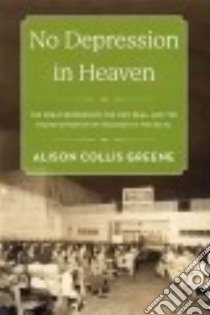- Libreria
- >
- Libri in lingua
- >
- Storia e archeologia
- >
- Storia
No Depression in Heaven - 9780199371877
Un libro in lingua di Greene Alison Collis edito da Oxford University Press, 2015
- € 36.50
- Il prezzo è variabile in funzione del cambio della valuta d’origine
Nowhere was the transition from church-based aid to federal welfare state brought about by the Great Depression more dramatic than in the South. For a moment, the southern Protestant establishment turned to face the suffering that plantation capitalism pushed behind its image of planter's hats and hoopskirts. When starving white farmers marched into an Arkansas town to demand food for their dying children and when priests turned away hungry widows and orphans because they were no needier than anyone else, southern clergy of both races spoke with one voice to say that they had done all they could. It was time for a higher power to intervene. They looked to God, and then they looked to Roosevelt.
When Roosevelt promised a new deal for the "forgotten man," Americans cheered, and when he took office, churches and private agencies gratefully turned much of the responsibility for welfare and social reform over to the state. Yet, argues historian Allison Collis Greene, Roosevelt's New Deal threatened plantation capitalism even while bending to it. Black southern churches worked to secure benefits for their own communities while white churches divided over loyalties to Roosevelt and Jim Crow. Frustrated by their failure and fractured by divisions over the New Deal, leaders in the major white Protestant denominations surrendered their moral authority in the South. Although the Protestant establishment retained a central role in American life for decades after the Depression, its slip from power made room for upstart Pentecostals and independent evangelicals, who emphasized personal rather than social salvation.
Informazioni bibliografiche
- Titolo del Libro in lingua: No Depression in Heaven
- Sottotitolo: The Great Depression, the New Deal, and the Transformation of Religion in the Delta
- Lingua: English
- Autore: Greene Alison Collis
- Editore: Oxford University Press
- Collana: Oxford Univ Pr (Hardcover)
- Data di Pubblicazione: 09 Dicembre '15
- Genere: HISTORY
- Argomenti : Depressions 1929 Arkansas Arkansas Delta Depressions 1929 Tennessee Memphis New Deal, 1933-1939 Arkansas Arkansas Delta
- Pagine: 317
- ISBN-10: 0199371873
- EAN-13: 9780199371877


